- Home
- Roald Dahl
Skin and Other Stories Page 5
Skin and Other Stories Read online
Page 5
He put the earphones on his head and switched on the machine. He listened for a moment to the faint familiar humming sound; then he picked up the axe, took a stance with his legs wide apart and swung the axe as hard as he could at the base of the tree trunk. The blade cut deep into the wood and stuck there, and at the instant of impact he heard a most extraordinary noise in the earphones. It was a new noise, unlike any he had heard before - a harsh, noteless, enormous noise, a growling, low-pitched, screaming sound, not quick and short like the noise of the roses, but drawn out like a sob lasting for fully a minute, loudest at the moment when the axe struck, fading gradually fainter and fainter until it was gone.
Klausner stared in horror at the place where the blade of the axe had sunk into the woodflesh of the tree; then gently he took the axe handle, worked the blade loose and threw the thing to the ground. With his fingers he touched the gash that the axe had made in the wood, touching the edges of the gash, trying to press them together to close the wound, and he kept saying, 'Tree ... oh, tree ... I am sorry ... I am sorry ... but it will heal ... it will heal fine ...'
For a while he stood there with his hands upon the trunk of the great tree; then suddenly he turned away and hurried off out of the park, across the road, through the front gate and back into his house. He went to the telephone, consulted the book, dialled a number and waited. He held the receiver tightly in his left hand and tapped the table impatiently with his right. He heard the telephone buzzing at the other end, and then the click of a lifted receiver and a man's voice, a sleepy voice, saying: 'Hullo. Yes.'
'Dr Scott?' he said.
'Yes. Speaking.'
'Dr Scott. You must come at once - quickly, please.'
'Who is it speaking?'
'Klausner here, and you remember what I told you last night about my experience with sound, and how I hoped I might -'
'Yes, yes, of course, but what's the matter? Are you ill?'
'No, I'm not ill, but -'
'It's half-past six in the morning,' the Doctor said, 'and you call me but you are not ill.'
'Please come. Come quickly. I want someone to hear it. It's driving me mad! I can't believe it ...'
The Doctor heard the frantic, almost hysterical note in the man's voice, the same note he was used to hearing in the voices of people who called up and said, 'There's been an accident. Come quickly.' He said slowly, 'You really want me to get out of bed and come over now?'
'Yes, now. At once, please.'
'All right, then - I'll come.'
Klausner sat down beside the telephone and waited. He tried to remember what the shriek of the tree had sounded like, but he couldn't. He could remember only that it had been enormous and frightful and that it had made him feel sick with horror. He tried to imagine what sort of noise a human would make if he had to stand anchored to the ground while someone deliberately swung a small sharp thing at his leg so that the blade cut in deep and wedged itself in the cut. Same sort of noise perhaps? No. Quite different. The noise of the tree was worse than any known human noise because of that frightening, toneless, throatless quality. He began to wonder about other living things, and he thought immediately of a field of wheat standing up straight and yellow and alive, with the mower going through it, cutting the stems, five hundred stems a second, every second. Oh, my God, what would that noise be like? Five hundred wheat plants screaming together and every second another five hundred being cut and screaming and - no, he thought, I do not want to go to a wheat field with my machine. I would never eat bread after that. But what about potatoes and cabbages and carrots and onions? And what about apples? Ah, no. Apples are all right. They fall off naturally when they are ripe. Apples are all right if you let them fall off instead of tearing them from the tree branch. But not vegetables. Not a potato for example. A potato would surely shriek; so would a carrot and an onion and a cabbage ...
He heard the click of the front-gate latch and he jumped up and went out and saw the tall doctor coming down the path, little black bag in hand.
'Well,' the Doctor said. 'Well, what's all the trouble?'
'Come with me, Doctor, I want you to hear it. I called you because you're the only one I've told. It's over the road in the park. Will you come now?'
The Doctor looked at him. He seemed calmer now. There was no sign of madness or hysteria; he was merely disturbed and excited.
They went across the road into the park and Klausner led the way to the great beech tree at the foot of which stood the long black coffin-box of the machine - and the axe.
'Why did you bring it out here?' the Doctor asked.
'I wanted a tree. There aren't any big trees in the garden.'
'And why the axe?'
'You'll see in a moment. But now please put on these earphones and listen. Listen carefully and tell me afterwards precisely what you hear. I want to make quite sure ...'
The Doctor smiled and took the earphones and put them over his ears.
Klausner bent down and flicked the switch on the panel of the machine; then he picked up the axe and took his stance with his legs apart, ready to swing. For a moment he paused.
'Can you hear anything?' he said to the Doctor.
'Can I what?'
'Can you hear anything?'
'Just a humming noise.'
Klausner stood there with the axe in his hands trying to bring himself to swing, but the thought of the noise that the tree would make made him pause again.
'What are you waiting for?' the Doctor asked.
'Nothing,' Klausner answered, and then lifted the axe and swung it at the tree, and as he swung, he thought he felt, he could swear he felt a movement of the ground on which he stood. He felt a slight shifting of the earth beneath his feet as though the roots of the tree were moving underneath the soil, but it was too late to check the blow and the axe blade struck the tree and wedged deep into the wood. At that moment, high overhead, there was the cracking sound of wood splintering and the swishing sound of leaves brushing against other leaves and they both looked up and the Doctor cried, 'Watch out! Run, man! Quickly, run!'
The Doctor had ripped off the earphones and was running away fast, but Klausner stood spellbound, staring up at the great branch, sixty feet long at least, that was bending slowly downward, breaking and crackling and splintering at its thickest point, where it joined the main trunk of the tree. The branch came crashing down and Klausner leapt aside just in time. It fell upon the machine and smashed it into pieces.
'Great heavens!' shouted the Doctor as he came running back. 'That was a near one! I thought it had got you!'
Klausner was staring at the tree. His large head was leaning to one side and upon his smooth white face there was a tense, horrified expression. Slowly he walked up to the tree and gently he prised the blade loose from the trunk.
'Did you hear it?' he said, turning to the Doctor. His voice was barely audible.
The Doctor was still out of breath from running and the excitement. 'Hear what?'
'In the earphones. Did you hear anything when the axe struck?'
The Doctor began to rub the back of his neck. 'Well,' he said, 'as a matter of fact ...' He paused and frowned and bit his lower lip. 'No, I'm not sure. I couldn't be sure. I don't suppose I had the earphones on for more than a second after the axe struck.'
'Yes, yes, but what did you hear?'
'I don't know,' the Doctor said. 'I don't know what I heard. Probably the noise of the branch breaking.' He was speaking rapidly, rather irritably.
'What did it sound like?' Klausner leaned forward slightly, staring hard at the Doctor. 'Exactly what did it sound like?'
'Oh hell!' the Doctor said. 'I really don't know. I was more interested in getting out of the way. Let's leave it.'
'Dr Scott, what-did-it-sound-like?'
'For God's sake, how could I tell, what with half the tree falling on me and having to run for my life?' The Doctor certainly seemed nervous. Klausner had sensed it now. He stood quite still, starin
g at the Doctor and for fully half a minute he didn't speak. The Doctor moved his feet, shrugged his shoulders and half turned to go. 'Well,' he said, 'we'd better get back.'
'Look,' said the little man, and now his smooth white face became suddenly suffused with colour. 'Look,' he said, 'you stitch this up.' He pointed to the last gash that the axe had made in the tree trunk. 'You stitch this up quickly.'
'Don't be silly,' the Doctor said.
'You do as I say. Stitch it up.' Klausner was gripping the axe handle and he spoke softly, in a curious, almost a threatening tone.
'Don't be silly,' the Doctor said. 'I can't stitch through wood. Come on. Let's get back.'
'So you can't stitch through wood?'
'No, of course not.'
'Have you got any iodine in your bag?'
'What if I have?'
'Then paint the cut with iodine. It'll sting, but that can't be helped.'
'Now look,' the Doctor said, and again he turned as if to go. 'Let's not be ridiculous. Let's get back to the house and then ...'
'Paint-the-cut-with-iodine.'
The Doctor hesitated. He saw Klausner's hands tightening on the handle of the axe. He decided that his only alternative was to run away fast, and he certainly wasn't going to do that.
'All right,' he said. 'I'll paint it with iodine.'
He got his black bag which was lying on the grass about ten yards away, opened it and took out a bottle of iodine and some cotton wool. He went up to the tree trunk, uncorked the bottle, tipped some of the iodine on to the cotton wool, bent down and began to dab it into the cut. He kept one eye on Klausner who was standing motionless with the axe in his hands, watching him.
'Make sure you get it right in.'
'Yes,' the Doctor said.
'Now do the other one - the one just above it!'
The Doctor did as he was told.
'There you are,' he said. 'It's done.'
He straightened up and surveyed his work in a very serious manner. 'That should do nicely.'
Klausner came closer and gravely examined the two wounds.
'Yes,' he said, nodding his huge head slowly up and down. 'Yes, that will do nicely.' He stepped back a pace. 'You'll come and look at them again tomorrow?'
'Oh, yes,' the Doctor said. 'Of course.'
'And put some more iodine on?'
'If necessary, yes.'
'Thank you, Doctor,' Klausner said, and he nodded his head again and he dropped the axe and all at once he smiled, a wild, excited smile, and quickly the Doctor went over to him and gently he took him by the arm and he said, 'Come on, we must go now,' and suddenly they were walking away, the two of them, walking silently, rather hurriedly across the park, over the road, back to the house.
An African Story
For England, the war began in September, 1939. The people on the island knew about it at once and began to prepare themselves. In farther places the people heard about it a few minutes afterwards, and they too began to prepare themselves.
And in East Africa, in Kenya Colony, there was a young man who was a white hunter, who loved the plains and the valleys and the cool nights on the slopes of Kilimanjaro. He too heard about the war and began to prepare himself. He made his way over the country to Nairobi, and he reported to the RAF and asked that they make him a pilot. They took him in and he began his training at Nairobi airport, flying in little Tiger Moths and doing well with his flying.
After five weeks he nearly got court-martialled because he took his plane up and instead of practising spins and stall-turns as he had been ordered to do, he flew off in the direction of Nakuru to look at the wild animals on the plain. On the way, he thought he saw a Sable antelope, and because these are rare animals, he became excited and flew down low to get a better view. He was looking down at the antelope out of the left side of the cockpit, and because of this he did not see the giraffe on the other side. The leading edge of the starboard wing struck the neck of the giraffe just below the head and cut clean through it. He was flying as low as that. There was damage to the wing, but he managed to get back to Nairobi, and as I said, he was nearly court-martialled, because you cannot explain away a thing like that by saying you hit a large bird, not when there are pieces of giraffe skin and giraffe hair sticking to the wing and the stays.
After six weeks he was allowed to make his first solo cross-country flight, and he flew off from Nairobi to a place called Eldoret, which is a little town eight thousand feet up in the Highlands. But again he was unlucky. This time he had engine failure on the way, due to water in the fuel tanks. He kept his head and made a beautiful forced landing without damaging the aircraft, not far from a little shack which stood alone on the highland plain with no other habitation in sight. That is lonely country up there.
He walked over to the shack, and there he found an old man, living alone, with nothing but a small patch of sweet potatoes, some brown chickens and a black cow.
The old man was kind to him. He gave him food and milk and a place to sleep, and the pilot stayed with him for two days and two nights, until a rescue plane from Nairobi spotted his aircraft on the ground, landed beside it, found out what was wrong, went away and came back with clean petrol which enabled him to take off and return.
But during his stay, the old man, who was lonely and had seen no one for many months, was glad of his company and of the opportunity to talk. He talked much and the pilot listened. He talked of the lonely life, of the lions that came in the night, of the rogue elephant that lived over the hill in the west, of the hotness of the days and of the silence that came with the cold at midnight.
On the second night he talked about himself. He told a long, strange story, and as he told it, it seemed to the pilot that the old man was lifting a great weight off his shoulders in the telling. When he had finished, he said that he had never told that to anyone before, and that he would never tell it to anyone again, but the story was so strange that the pilot wrote it down on paper as soon as he got back to Nairobi. He wrote it not in the old man's words, but in his own words, painting it as a picture with the old man as a character in the picture, because that was the best way to do it. He had never written a story before, and so naturally there were mistakes. He did not know any of the tricks with words which writers use, which they have to use just as painters have to use tricks with paint, but when he had finished writing, when he put down his pencil and went over to the airmen's canteen for a pint of beer, he left behind him a rare and powerful tale.
We found it in his suitcase two weeks later when we were going through his belongings after he had been killed in training, and because he seemed to have no relatives, and because he was my friend, I took the manuscript and looked after it for him.
This is what he wrote.
The old man came out of the door into the bright sunshine, and for a moment he stood leaning on his stick, looking around him, blinking at the strong light. He stood with his head on one side, looking up, listening for the noise which he thought he had heard.
He was small and thick and well over seventy years old, although he looked nearer eighty-five, because rheumatism had tied his body into knots. His face was covered with grey hair, and when he moved his mouth, he moved it only on one side of his face. On his head, whether indoors or out, he wore a dirty white topee.
He stood quite still in the bright sunshine, screwing up his eyes, listening for the noise.
Yes, there it was again. The head of the old man flicked around and he looked towards the small wooden hut standing a hundred yards away on the pasture. This time there was no doubt about it: the yelp of a dog, the high-pitched, sharp-piercing yelp of pain which a dog gives when he is in great danger. Twice more it came and this time the noise was more like a scream than a yelp. The note was higher and more sharp, as though it were wrenched quickly from some small place inside the body.
The old man turned and limped fast across the grass towards the wooden shed where Judson lived, pushed open the door and went
in.
The small white dog was lying on the floor and Judson was standing over it, his legs apart, his black hair falling all over his long, red face; standing there tall and skinny, muttering to himself and sweating through his greasy white shirt. His mouth hung open in an odd, lifeless way, as though his jaw was too heavy for him, and he was dribbling gently down the middle of his chin. He stood there looking at the small white dog which was lying on the floor, and with one hand he was slowly twisting his left ear; in the other he held a heavy bamboo.
The old man ignored Judson and went down on his knees beside his dog, gently running his thin hands over its body. The dog lay still, looking up at him with watery eyes. Judson did not move. He was watching the dog and the man.
Slowly the old man got up, rising with difficulty, holding the top of his stick with both hands and pulling himself to his feet. He looked around the room. There was a dirty rumpled mattress lying on the floor in the far corner; there was a wooden table made of packing cases and on it a Primus stove and a chipped blue-enamelled saucepan. There were chicken feathers and mud on the floor.
The old man saw what he wanted. It was a heavy iron bar standing against the wall near the mattress, and he hobbled over towards it, thumping the hollow wooden floorboards with his stick as he went. The eyes of the dog followed his movements as he limped across the room. The old man changed his stick to his left hand, took the iron bar in his right, hobbled back to the dog and without pausing, he lifted the bar and brought it down hard upon the animal's head. He threw the bar to the ground and looked up at Judson, who was standing there with his legs apart, dribbling down his chin and twitching around the corners of his eyes. He went right up to him and began to speak. He spoke very quietly and slowly, with a terrible anger, and as he spoke he moved only one side of his mouth.
'You killed him,' he said. 'You broke his back.'
Then, as the tide of anger rose and gave him strength, he found more words. He looked up and spat them into the face of the tall Judson, who twitched around the corners of his eyes and backed away towards the wall.
'You lousy, mean, dog-beating bastard. That was my dog. What the hell right have you got beating my dog, tell me that. Answer me, you slobbering madman. Answer me.'

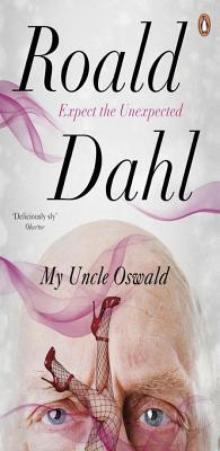 My Uncle Oswald
My Uncle Oswald The Best of Roald Dahl
The Best of Roald Dahl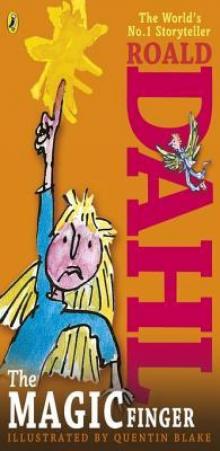 The Magic Finger
The Magic Finger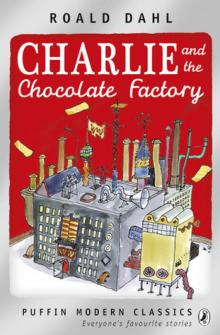 Charlie and the Chocolate Factory
Charlie and the Chocolate Factory Fantastic Mr Fox
Fantastic Mr Fox Matilda
Matilda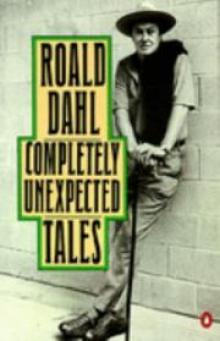 Completely Unexpected Tales: Tales of the Unexpected. More Tales of the Unexpected
Completely Unexpected Tales: Tales of the Unexpected. More Tales of the Unexpected The Wonderful Story of Henry Sugar and Six More
The Wonderful Story of Henry Sugar and Six More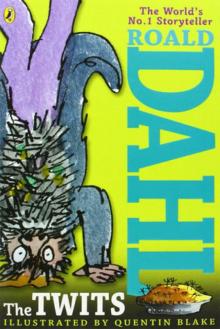 The Twits
The Twits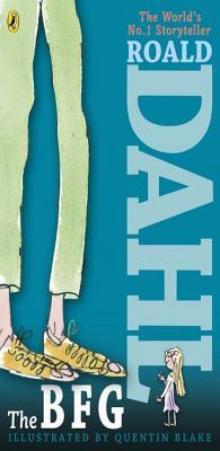 The BFG
The BFG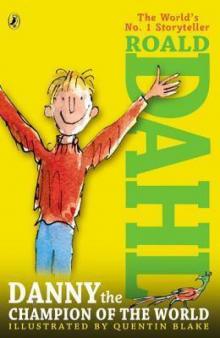 Danny the Champion of the World
Danny the Champion of the World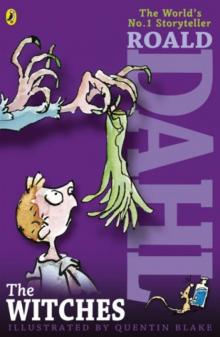 The Witches
The Witches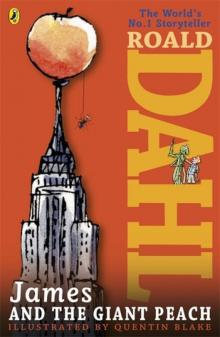 James and the Giant Peach
James and the Giant Peach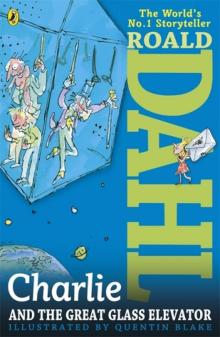 Charlie and the Great Glass Elevator
Charlie and the Great Glass Elevator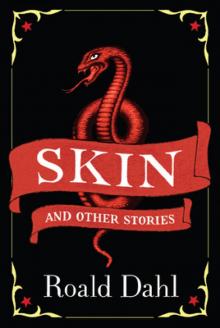 Skin and Other Stories
Skin and Other Stories Kiss Kiss
Kiss Kiss Switch Bitch
Switch Bitch The Giraffe and the Pelly and Me
The Giraffe and the Pelly and Me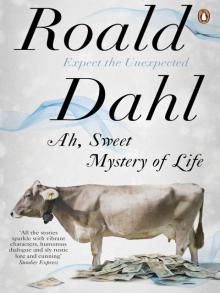 Ah, Sweet Mystery of Life
Ah, Sweet Mystery of Life Fear
Fear The Great Automatic Grammatizator and Other Stories
The Great Automatic Grammatizator and Other Stories Someone Like You
Someone Like You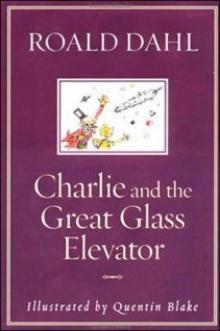 Charlie and the Great Glass Elevator c-2
Charlie and the Great Glass Elevator c-2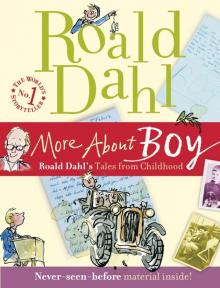 More About Boy
More About Boy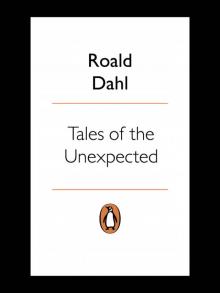 Tales of the Unexpected
Tales of the Unexpected The Umbrella Man and Other Stories
The Umbrella Man and Other Stories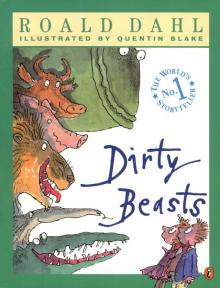 Dirty Beasts
Dirty Beasts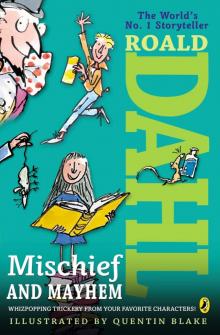 Roald Dahl's Mischief and Mayhem
Roald Dahl's Mischief and Mayhem The Collected Short Stories of Roald Dahl, Volume 1
The Collected Short Stories of Roald Dahl, Volume 1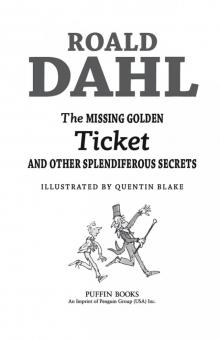 The Missing Golden Ticket and Other Splendiferous Secrets
The Missing Golden Ticket and Other Splendiferous Secrets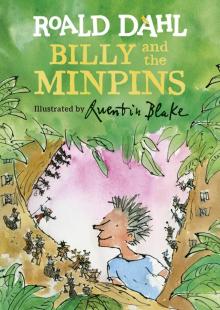 Billy and the Minpins
Billy and the Minpins Over to You
Over to You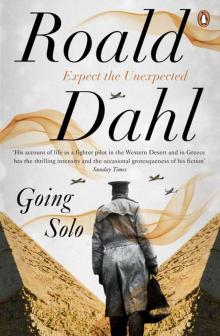 Going Solo
Going Solo Deception
Deception War
War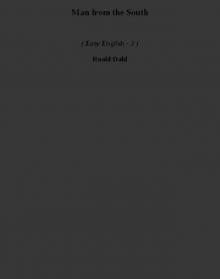 Man from the South ee-3
Man from the South ee-3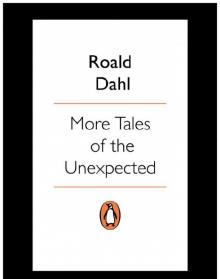 More Tales of the Unexpected
More Tales of the Unexpected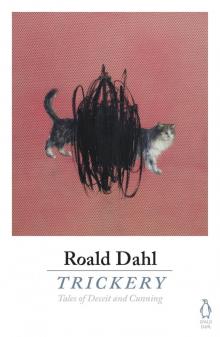 Trickery
Trickery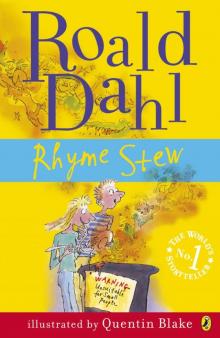 Rhyme Stew
Rhyme Stew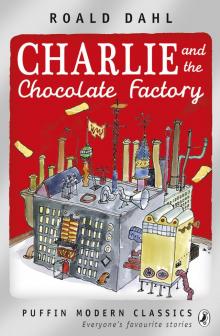 Charlie and the Chocolate Factory (Puffin Modern Classics relaunch)
Charlie and the Chocolate Factory (Puffin Modern Classics relaunch)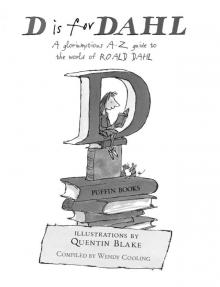 D is for Dahl
D is for Dahl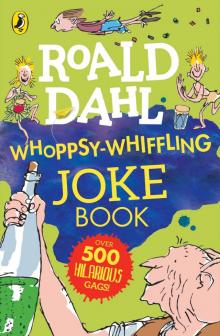 Roald Dahl Whoppsy-Whiffling Joke Book
Roald Dahl Whoppsy-Whiffling Joke Book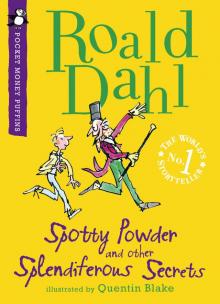 Spotty Powder and other Splendiferous Secrets
Spotty Powder and other Splendiferous Secrets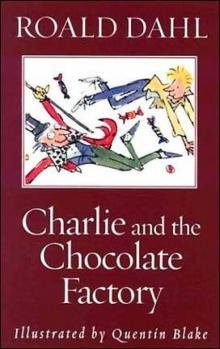 Charlie and the Chocolate Factory c-1
Charlie and the Chocolate Factory c-1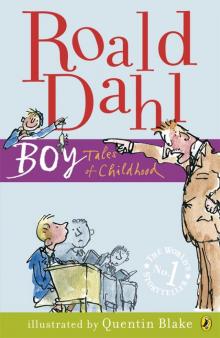 Boy
Boy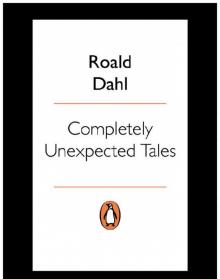 Completely Unexpected Tales
Completely Unexpected Tales Madness
Madness Innocence
Innocence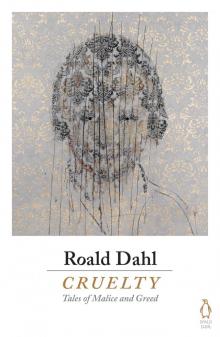 Cruelty
Cruelty George's Marvellous Medicine
George's Marvellous Medicine